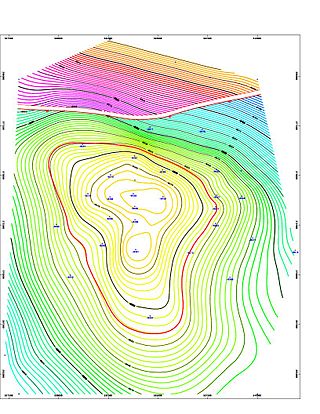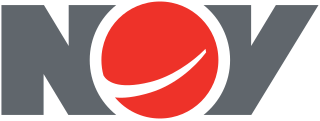Related Research Articles

Petroleum engineering is a field of engineering concerned with the activities related to the production of hydrocarbons, which can be either crude oil or natural gas. Exploration and production are deemed to fall within the upstream sector of the oil and gas industry. Exploration, by earth scientists, and petroleum engineering are the oil and gas industry's two main subsurface disciplines, which focus on maximizing economic recovery of hydrocarbons from subsurface reservoirs. Petroleum geology and geophysics focus on provision of a static description of the hydrocarbon reservoir rock, while petroleum engineering focuses on estimation of the recoverable volume of this resource using a detailed understanding of the physical behavior of oil, water and gas within porous rock at very high pressure.

An oil refinery or petroleum refinery is an industrial process plant where petroleum is transformed and refined into products such as gasoline (petrol), diesel fuel, asphalt base, fuel oils, heating oil, kerosene, liquefied petroleum gas and petroleum naphtha. Petrochemical feedstock like ethylene and propylene can also be produced directly by cracking crude oil without the need of using refined products of crude oil such as naphtha. The crude oil feedstock has typically been processed by an oil production plant. There is usually an oil depot at or near an oil refinery for the storage of incoming crude oil feedstock as well as bulk liquid products. In 2020, the total capacity of global refineries for crude oil was about 101.2 million barrels per day.

An oil well is a drillhole boring in Earth that is designed to bring petroleum oil hydrocarbons to the surface. Usually some natural gas is released as associated petroleum gas along with the oil. A well that is designed to produce only gas may be termed a gas well. Wells are created by drilling down into an oil or gas reserve that is then mounted with an extraction device such as a pumpjack which allows extraction from the reserve. Creating the wells can be an expensive process, costing at least hundreds of thousands of dollars, and costing much more when in hard to reach areas, e.g., when creating offshore oil platforms. The process of modern drilling for wells first started in the 19th century, but was made more efficient with advances to oil drilling rigs during the 20th century.

Baker Hughes Company is an American energy company based in Houston, Texas. As one of the world's largest oil field services companies, it provides products and services for oil well drilling, formation evaluation, completion, production, and reservoir consulting. It operates in over 120 countries, with research and manufacturing facilities in Australia, Singapore, Malaysia, India, Dubai, Saudi Arabia, Italy, Germany, Norway, Oklahoma, Louisiana and Missouri. From 2017 to 2020, the company was majority owned by General Electric (GE); however, GE no longer owns an economic stake in the company. The company is incorporated in Delaware.

The petroleum industry, also known as the oil industry or the oil patch, includes the global processes of exploration, extraction, refining, transportation, and marketing of petroleum products. The largest volume products of the industry are fuel oil and gasoline (petrol). Petroleum is also the raw material for many chemical products, including pharmaceuticals, solvents, fertilizers, pesticides, synthetic fragrances, and plastics. The industry is usually divided into three major components: upstream, midstream, and downstream. Upstream regards exploration and extraction of crude oil, midstream encompasses transportation and storage of crude, and downstream concerns refining crude oil into various end products.
Liwa Petroleum & Industrial Supplies is a trading company in the oil, gas and petrochemical sectors and focuses on specialized equipment and services, as well as representing international EPC contractors and pipeline providers in Abu Dhabi, where the company is headquartered.

Industrial wastewater treatment describes the processes used for treating wastewater that is produced by industries as an undesirable by-product. After treatment, the treated industrial wastewater may be reused or released to a sanitary sewer or to a surface water in the environment. Some industrial facilities generate wastewater that can be treated in sewage treatment plants. Most industrial processes, such as petroleum refineries, chemical and petrochemical plants have their own specialized facilities to treat their wastewaters so that the pollutant concentrations in the treated wastewater comply with the regulations regarding disposal of wastewaters into sewers or into rivers, lakes or oceans. This applies to industries that generate wastewater with high concentrations of organic matter, toxic pollutants or nutrients such as ammonia. Some industries install a pre-treatment system to remove some pollutants, and then discharge the partially treated wastewater to the municipal sewer system.
A mud engineer works on an oil well or gas well drilling rig, and is responsible for ensuring the properties of the drilling fluid, also known as drilling mud, are within designed specifications.

A chemical plant is an industrial process plant that manufactures chemicals, usually on a large scale. The general objective of a chemical plant is to create new material wealth via the chemical or biological transformation and or separation of materials. Chemical plants use specialized equipment, units, and technology in the manufacturing process. Other kinds of plants, such as polymer, pharmaceutical, food, and some beverage production facilities, power plants, oil refineries or other refineries, natural gas processing and biochemical plants, water and wastewater treatment, and pollution control equipment use many technologies that have similarities to chemical plant technology such as fluid systems and chemical reactor systems. Some would consider an oil refinery or a pharmaceutical or polymer manufacturer to be effectively a chemical plant.

NOV Inc., formerly National Oilwell Varco, is an American multinational corporation based in Houston, Texas. It is a worldwide provider of equipment and components used in oil and gas drilling and production operations, oilfield services, and supply chain integration services to the upstream oil and gas industry. The company conducts operations in more than 500 locations across six continents, operating through three reporting segments: Rig Technologies, Wellbore Technologies, and Completion & Production Solutions.

A petroleum reservoir or oil and gas reservoir is a subsurface accumulation of hydrocarbons contained in porous or fractured rock formations. Such reservoirs form when kerogen is created in surrounding rock by the presence of high heat and pressure in the Earth's crust.

In geotechnical engineering, drilling fluid, also known as drilling mud, is used to aid the drilling of boreholes into the earth. Used while drilling oil and natural gas wells and on exploration drilling rigs, drilling fluids are also used for much simpler boreholes, such as water wells.

Drill cuttings are broken bits of solid material removed from a borehole drilled by rotary, percussion, or auger methods and brought to the surface in the drilling mud. Boreholes drilled in this way include oil or gas wells, water wells, and holes drilled for geotechnical investigations or mineral exploration.
Drilling engineering is a subset of petroleum engineering.

The Ministry of Petroleum (MOP) (Persian: وزارت نفت, romanized: Vezârat-e Naft) manages the oil industry, the producer of oil and petrochemical products. MoP is in charge of all issues pertaining to exploration, extraction, exploitation, distribution and exportation of crude oil and oil products. In addition, according to the "Imports and Exports Regulation Act", issuing import licenses for such products is also among the functions of the Ministry of Petroleum. The ministry has been placed under sanctions by the United States Department of State as of 2020.

Petroleum is a fossil fuel that can be drawn from beneath the Earth's surface. Reservoirs of petroleum are formed through the mixture of plants, algae, and sediments in shallow seas under high pressure. Petroleum is mostly recovered from oil drilling. Seismic surveys and other methods are used to locate oil reservoirs. Oil rigs and oil platforms are used to drill long holes into the earth to create an oil well and extract petroleum. After extraction, oil is refined to make gasoline and other products such as tires and refrigerators. Extraction of petroleum can be dangerous and have led to oil spills.

The Bouri Offshore Field is part of Block NC-41, which is located 120 kilometers (75 mi) north of the Libyan coast in the Mediterranean Sea. It was first discovered in 1976 at a depth of 8,700 feet (2,700 m) and is estimated to contain 4.5 billion barrels (720,000,000 m3) in proven recoverable crude oil reserves and 3.5 trillion cubic feet (99 km3) of associated natural gas with an annual production potential of 6 billion m³. Bouri is considered the largest producing oilfield in the Mediterranean.
The Lubrizol Corporation is an American provider of specialty chemicals for the transportation, industrial and consumer markets. These products include additives for engine oils and other transportation-related fluids, additives for industrial lubricants, and additives for gasoline and diesel fuel. In addition, Lubrizol makes ingredients and additives for personal care products, pharmaceuticals and medical devices, specialty materials, including plastics technology, and coatings in the form of specialty resins and additives.
Oilfield terminology refers to the jargon used by those working in fields within and related to the upstream segment of the petroleum industry. It includes words and phrases describing professions, equipment, and procedures specific to the industry. It may also include slang terms used by oilfield workers to describe the same.

Dana Energy is a private oil and gas company headquartered in Tehran, Iran. It is an exploration and production (E&P) and oilfield services company operating in Middle East and Asia. Formed in 2000, they were initially an oilfield services company and ventured into field development in 2008. By the addition of petroleum products trading to its portfolio in 2013, Dana Energy extended their business into the midstream sector, however due to sanctions imposed on Iran, their trading division came to a halt.
References
- Intsok Intsok Onshore Market Report 2006 [ permanent dead link ]
- National Authority for Information and Statistics, Socialist People’s Libyan Arab Jamahiriya.
- Pilat D. (2000), Innovation and Productivity in Services - State of the Art, Organization for Economic Cooperation and Development, Directorate for Science, Technology, and Industry